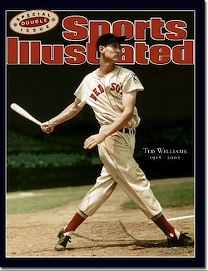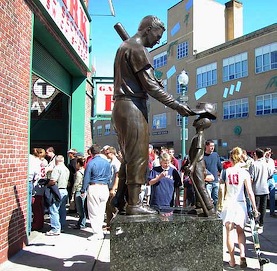HBO's Ted Williams doc hits the not-so-sweet spots, too
07/15/09 10:35 AM


By ED BARK
HBO took an All-Star game break between its two looks at Teds.
The network's airbrushed In His Own Words tribute to Ted Kennedy aired on Monday night. Now comes Ted Williams, a far blunter and more objective assessment of the Boston Red Sox great -- and ingrate.
Premiering Wednesday, July 15th at 8:30 p.m. (central), the 85-minute documentary calls on old teammates, relatives, biographers and admirers Robert Redford and George H.W. Bush in portraying a slugger who made hitting his science and relationships his bane.
The foul-tempered, profane and demanding baseball legend remains the last major league player to hit .400 -- in 1941. But although he mellowed somewhat in his autumn years, Williams never seemed to overcome a less than idyllic childhood in which his mother devoted her life to Salvation Army work while his father mostly stayed away. He compensated by hitting baseballs.
"It was ironic that his mother was off saving everybody else's soul and wasn't around to really take care of her kids," says Williams biographer Leigh Montville. "I think he had a very strange relationship with his mother, feeling that she'd kind of let him down."
Williams never talked much about his personal life. But the HBO documentary does have an audio snippet from the man himself.
"I wouldn't want to be married to a gal like that," he once said of his mother. "The house was dirty, and Jesus, I hated it."
Williams ended up being a lousy husband -- three divorces -- and belittling father himself.
Second wife Lee Williams says, "We were afraid of making a move, afraid of setting him off."
Williams' youngest of three children, Claudia, has emerged as a defender of her cantankerous old man, who died on July 5, 2002 after a triumphant 1999 return to the All-Star game in Boston's Fenway Park. But she also speaks candidly about the very tough love dad dispensed.
"It was hard to keep up with his emotions," she recalls. "But you needed to be a duck and let that water roll off your back. And it took a while to learn that."
Dubbed "The Kid" in his early days with the Red Sox, Williams lost five years of prime playing time to military service in WWII and the Korean War. Still, he hit 521 home runs in the pre-steroids era, the last one in his final at bat on Sept. 28, 1960. "Teddy Ballgame" -- another of his nicknames -- always had a flair for the dramatic, even while waging verbal warfare with writers, fans and wives.
Robert Redford, who worshipped Williams from afar as a kid, says his 1984 baseball film, The Natural, was an homage to the Red Sox legend. He wore Williams' No. 9 as the emotionally and physically damaged Roy Hobbs, but never met the man.
"I wanted him to come on the set so I could shake his hand. But he was too busy fishin'," Redford says with a laugh.
For much of his life, Williams went to bat for sick kids via the Jimmy Fund he championed. He mostly didn't publicize his charitable work, and never enjoyed mingling with fellow celebrities.
"He didn't like people who thought they were something great, and maybe thought he wasn't," says writer Richard Ben Cramer.
Toward the end, Williams' estranged only son, John Henry, reunited with his father and became his caretaker. But most people remember their relationship as mercenary, with the son cajoling his father to autograph as many baseballs and pictures as possible before he passed. John Henry, who died at age 35 of leukemia, also was condemned and ridiculed for having his father cryogenically frozen, supposedly in accordance with his wishes.
"To his credit, he (John Henry) spent a lot of time with his father," says writer Dan Shaughnessy. "It wasn't a barrel of laughs those last 10 years -- getting him in the shower, dressing him. And John was there . . . I think he had some weird ideas, but I do believe he loved his dad."
The HBO film ends with footage of Williams circling the bases, head bowed, after hitting his final home run. It's a surprisingly grainy, fuzzy look, even though 1960 hardly qualifies as ancient times.
Imagine if ESPN's Sports Center had existed in its current form back then. We would have seen the home run live and in crystal-clear clarity -- over and over again. But Williams no doubt would have hated the scrutiny -- and cursed ESPN as well. He was that kind of a guy -- almost impossible to get along with, but so very sweet to watch.
GRADE: B+
